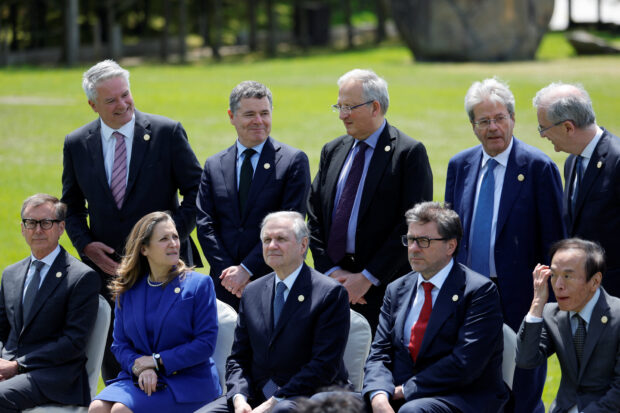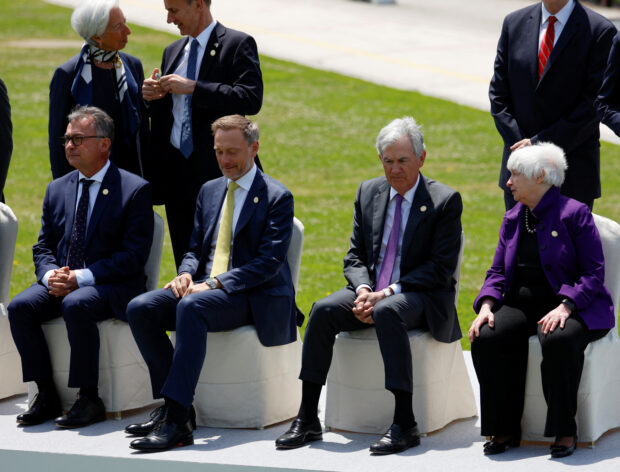G7 finance heads face tricky trade-off in debating steps to counter China

Bank of Japan Governor Kazuo Ueda, Italy’s Economy Minister Giancarlo Giorgetti, Bank of Italy Governor Ignazio Visco, Canada’s Minister of Finance Chrystia Freeland, Bank of Canada Governor Tiff Macklem, Bank of France Governor Francois Villeroy de Galhau, European Commissioner for Economy Paolo Gentiloni, Deputy Governor of the Bank of England Jon Cunliffe, Eurogroup President Paschal Donohoe, and Organisation for Economic Cooperation and Development Secretary-General Mathias Cormann attend a photo session at the G7 Finance Ministers and Central Bank Governors’ meeting in Niigata, Japan, May 12, 2023. REUTERS/Issei Kato
NIIGATA, Japan -Finance leaders of the Group of Seven (G7) advanced economies will debate this week the idea of implementing targeted controls on investments to China, which analysts see as a double-edged sword that could make little headway.
China is much on the minds of G7 finance leaders gathering in the Japanese city of Niigata, with current chair Japan leading fresh efforts to diversify supply chains and reduce their heavy reliance on Beijing.
But the group is not on the same page in terms of how far it should go in countering China, as hurting trade with the world’s second-largest economy could deal a heavy blow to export-reliant countries such as Germany and Japan.
The G7 nations can little afford further risks to their fragile economies, with Washington struggling to resolve a debt ceiling stand-off that could tip the U.S. economy into recession.
A scheduled meeting on Friday between U.S. President Joe Biden and top lawmakers was postponed until early next week as the two sides seek a compromise to avoid a catastrophic default.
German Finance Minister Christian Lindner said on Friday he hoped U.S. politicians would come to a “grown-up” decision on talks to raise the $31.4 trillion debt ceiling – the maximum amount the U.S. government is authorized to borrow – warning there was a risk to the global economy if they did not.
Countering China’s ‘economic coercion’
The United States is at the forefront in pushing for stronger steps against China. Treasury Secretary Janet Yellen said on Thursday many members of the G7 economies shared U.S. concerns about China’s use of “economic coercion” against other countries, and were considering ways to counter such behavior.

U.S. Treasury Secretary Janet Yellen, Federal Reserve Chair Jerome Powell, Germany’s Finance Minister Christian Lindner, and Joachim Nagel, President of Germany’s federal reserve Bundesbank, attend a family photo session at the G7 Finance Ministers and Central Bank Governors’ meeting in Niigata, Japan, May 12, 2023. REUTERS/Issei Kato
Germany is increasingly wary of China as a strategic rival and has considered steps to reassess bilateral ties, but is cautious of being seen as forging a G7 front against China.
Preliminary data provided to Reuters showed Germany’s direct investment in China continues to rise even as its government wants to “derisk” their relationship with Beijing.
While the G7 leaders’ summit next week could see debate on implementing targeted controls on investments to China, any screening of investments would be targeted to strategically important areas, a German government source said on Thursday.
The discussions among the finance leaders will lay the groundwork for the summit in Hiroshima.
Host Japan is cautious about the idea of outbound investment controls against China given the huge impact it could have on global trade and its own economy.
“Restricting outbound investment would be quite difficult,” said one of the officials, who spoke on condition of anonymity due to the sensitivity of the matter.
British Finance Minister Jeremy Hunt told the Nikkei newspaper on Thursday the G7 must counter China’s economic coercion, though made no mention of investment controls.
Supply chain diversification
Another initiative to be endorsed by the G7 is to create partnerships with low and middle-income nations to diversify supply chains away from countries like China.
Japan has invited six non-G7 countries, including Brazil, India and Indonesia, for an outreach meeting on Friday where supply chain partnerships will be discussed.
Analysts, however, are skeptical on how effective such steps to counter China would be.
“It’s very difficult to leave China out given its economic might,” said Toru Nishihama, chief emerging market economist at Dai-ichi Life Research Institute. “Doing so could divide world trade, damage global growth and hurt G7 economies themselves.”
The G7 finance leaders are expected to issue a joint statement after their three-day meeting ends on Saturday.
US debt standoff overshadows G7 finance leaders’ meeting
Japan to invite emerging nations to G7 finance leaders’ meeting
Read Next
Subscribe to INQUIRER PLUS to get access to The Philippine Daily Inquirer & other 70+ titles, share up to 5 gadgets, listen to the news, download as early as 4am & share articles on social media. Call 896 6000.
For all the latest Business News Click Here
For the latest news and updates, follow us on Google News.



